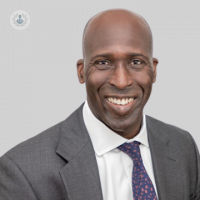Making decisions on fractures: Expert insights
Escrito por:In his latest online article, Mr Eyiyemi Pearse gives us his insights into fractures. He talks about if you should have your operation abroad, if you should let your fracture heal by itself or opt for an operation and what could happen if you don’t have an operation and the fracture doesn’t heal.

Should I have my operation abroad?
Many think clinics abroad see and treat lots of these injuries and they could be a good choice. Many also want to take advantage of travel insurance and get speedy treatment. These are reasonable considerations but because most patients are not followed up abroad and return home for after care and rehabilitation, we see huge variability when patients return to the UK after having had their treatment abroad, both in terms of the decision-making (whether an operation is the right thing or not) and in terms of quality (how well the operation has been carried out).
Should I let my fracture heal by itself or have an operation?
All fractures are painful and it can be hard to imagine that the pain will ever settle. Many fractures look like they may never heal because the bones are really far apart on the initial x-ray images. However, it is important to know that many painful displaced fractures heal without surgery. Important considerations are:
(a) How long it'll take for the fracture to heal without surgery and how it might affect your daily activities during the healing process.
(b) Whether the way the fracture heals, even if the bones are a bit misaligned, will significantly impact how well you can move.
(c) If there could be negative effects on your health from waiting to have surgery in case the bones don't heal properly.
(d) Whether your general health makes having a general anaesthetic risky.
Every fracture is different and everyone has different functional demands and the impact of extended time to healing and the impact of misaligned bones will differ between patients. As a result, all injuries require individualised discussions and personalised treatment plans designed using scientific evidence. Ideally this should be in a consultation conducted by an upper limb specialist rather than a generalist trauma surgeon.
What happens if I don’t have an operation and my fracture does not heal?
Failure of a fracture to heal as expected is called a non-union. This can happen with any fracture but is more common with some fractures rather than others. Your doctor should be able to advise you on the relative chances of non-union with and without surgery. Delayed operations to fix non-unions are more complex than early operations to fix acute fractures. With increased complexity comes increased risk of something going wrong and your surgeon should be able to advise you about the relative risks.
Mr Eyiyemi Pearse is a respected consultant orthopaedic shoulder and elbow surgeon. You can schedule an appointment with Mr Pearse on his Top Doctors profile.


